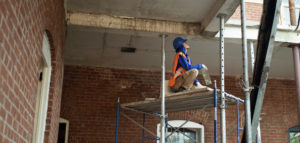
States, counties, and cities across the United States continue to implement safety precautions to slow the spread of the coronavirus outbreak (COVID-19). The coronavirus is affecting construction projects, and many are wondering if they can still work. Here, we’ve collected the orders issued within the state of New York to determine whether construction is considered an essential business in NY.
Federal guidelines for essential businesses
On March 28th, the Cybersecurity & Infrastructure Security Agency (CISA) – part of the Department of Homeland Security (DHS) – issued an advisory memorandum on what constitutes “essential critical infrastructure workers” during the COVID-19 pandemic. This list was intended to be a guide for state and local officials to protect their communities while ensuring the continuity of functions critical to public health and safety, as well as economic and national security.
However, states differ in their interpretation of “essential.” Some have adopted a broader definition, including construction in the list of essential businesses.
The CISA list identifies 16 different sectors that are considered essential. These include:
- Chemical Sector
- Commercial Facilities Sector
- Communications Sector
- Critical Manufacturing Sector
- Dams Sector
- Defense Industrial Base Sector
- Emergency Services Sector
- Energy Sector
- Financial Services Sector
- Food and Agriculture Sector
- Government Facilities Sector
- Healthcare and Public Health Sector
- Information Technology Sector
- Nuclear Reactors, Materials, and Waste Sector
- Transportation Systems Sector
- Water and Wastewater Systems Sector
For details under each sector, see: CISA: Advisory Memorandum on Identification of Essential Critical Infrastructure Workers During COVID-19 Response
Does New York consider construction essential?
On March 20, 2020, Governor Andrew Cuomo issued the “New York State on PAUSE” executive order that went into effect on March 22. This order restricts business operations to those that are deemed essential. Any violation of these regulations can result in fines of up to $10,000 per violation.
The term “essential business” in New York, for construction purposes, includes:
Essential Infrastructure
- Utilities including power generation, fuel supply, and transmission
- Public water & wastewater
- Telecommunications and data centers
- Airports & airlines
- Commercial shipping vessels/ports and seaports
- Transportation infrastructure, such as bus, rail, or for-hire vehicles, & garages
- Hotels and places of accommodation
Construction, including
- Skilled trades such as electricians, plumbers
- Other related construction firms and professionals for essential infrastructure for emergency repair and safety purposes.
Guidance on NY State essential construction
The Empire State Development Corporation (ESDC) also issued Guidance on Executive Order 202.6. According to the order, New York requires all non-essential construction to shut down, “except emergency construction, (e.g. a project necessary to protect health and safety of the occupants, or to continue a project if it would be unsafe to allow to remain undone, but only to the point that it is safe to suspend work).”
Under these guidelines, construction can proceed as long as the construction (or business) is:
- In support of roads, bridges, transit facilities, utilities, hospitals, or healthcare facilities, homeless shelters, or public or private schools
- For affordable housing, defined as work where either:
- A minimum of 20% of the residential units are or will be deemed affordable and are or will be subject to a regulatory agreement and/or declaration from a local, state, or federal government agency; or
- The project is being undertaken by, or on behalf of, a public housing authority.
- Necessary to protect the health and safety of occupants of the structure
- Necessary to continue a project if allowing the project to remain undone would be unsafe
- Provided that construction is shut down once it is safe to do so.
- A project in the energy industry, such as maintenance and repair of essential infrastructure
- For a full list see question 14 of the ESDC FAQs
- An existing project of an essential business; or
- Being completed by a single worker who is the sole employee/worker on the job site.
The order also permits local government construction projects, which are exempt from essential business restrictions.
“Local governments, including municipalities and school districts, are allowed to continue construction projects at this time as government entities are exempt from these essential business restrictions. However, to the greatest extent possible, local governments should postpone any non-essential projects and only proceed with essential projects when they can implement appropriate social distancing and cleaning/disinfecting protocols.”
Before submitting a request for “essential designation” be sure to review the ESDC Guidance ahead of time.
Construction in New York counties
New York City: Bronx, Kings, New York, Queens & Richmond Counties
In addition to the restrictions imposed state-wide, the NYC Department of Buildings also issued some further details on what is considered “essential and emergency construction” within the city limits under the ESDC guidelines.
Emergency Construction allowed includes:
- Projects necessary to protect the health and safety of the occupants;
- Emergency work ordered by the Department; &
- Restoration of essential services, such as:
- Heat, hot & cold water, gas, electricity, or other utility services; or
- Work necessary to address any condition requiring immediate corrective action that severely affects life, health, safety, property or a significant number of persons.
Essential Construction allowed includes:
- Utilities
- Hospitals or health care facilities
- Transitional and/or homeless shelters
- Affordable housing and other specified types of properties as specified by the Department
- Other essential construction as approved by the Department
Also, work that is limited to a single worker, who is the sole employee/worker on the job site.
Note: If and when any other NY counties adopt more restrictions on construction activities than what is outlined in the state-wide order we will update this post.
What New York contractors should do now
Whether your construction project is considered essential business or not, contractors and suppliers in New York should act now to get paid and protect cash flow.
If your NY project is canceled
What if New York doesn’t consider your construction project essential business? If you haven’t been paid for work you’ve already completed, the best thing to do right now is to file a mechanics lien. Everyone is trying to get for the work they’ve already done; filing a lien will put you first in line.
Apply for an SBA Paycheck Protection Loan, and explore other avenues to get cash. Funding will get harder to access as more time passes.
If your NY project is considered essential
If you’re working in a part of New York where your construction project is allowed to continue, pay close attention to social distancing and hygiene requirements. Businesses found violating these requirements are also subject to the $10,000 fine.
According to the governor’s order, “it is required that the personnel working on the site maintain an appropriate social distance, including for purposes of elevators/meals/entry and exits. Sites that cannot maintain appropriate social distancing, as well as cleaning/disinfecting protocols must close.”
In addition, it’s critical that you take every step you can to get paid for your work — and get paid faster. The only thing that’s certain right now is that nothing is certain. Set up a strict payment process to send:
and other documents on every single project. Pay close attention to New York deadlines to file a mechanics lien or bond claim.
Amidst coronavirus chaos, the construction businesses that communicate, document, and diligently pursue their payments are the ones that are most likely to come out on the other side, ready to thrive.

